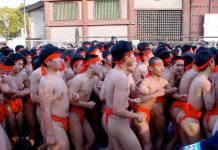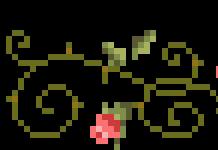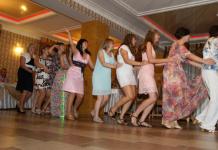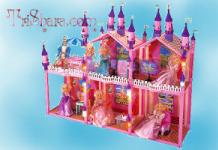The nanny of Alexander Sergeevich Pushkin, Arina Rodionovna Yakovleva, was born on April 10 (21), 1758 in the village of Suida (now the village of Voskresenskoye), or rather, half a verst from Suida, in the village of Lampovo, Koporsky district, Petersburg province. Her mother, Lukerya Kirillova, and her father, Rodion Yakovlev, were serfs, had seven children.
Arina was her home name, and her real name was Irina or Irinya. As a peasant serf, the nanny did not have a surname. In the documents (revision tales, metric church books, etc.), she is named after her father - Rodionova, and in everyday life - Rodionovna. She was called Rodionovna when she was old, as is sometimes done in the villages. Pushkin himself never once called her by name, but wrote "nanny" in his letters.

In literature, she is referred to more often as Arina Rodionovna, without a surname, or, less often, under the surname Yakovlev. One of the later publications says: "The appearance in contemporary literature about the nanny A.S. Pushkin's surname Yakovlev, as if it belonged to her, is not justified by anything. None of the poet's contemporaries called her Yakovleva. "However, this is a moot point, because the children are named after their father, and her father's surname is Yakovlev. Sometimes, by the way, she was also called Arina Matveeva, after her husband.
As a child, she was listed as a serf second lieutenant of the Semenovsky Life Guards Regiment, Count Fedor Alekseevich Apraksin. In 1759, the great-grandfather of A.S. bought Suida and the adjacent villages with people from Apraksin. Pushkin - A.P. Hannibal. In 1781, Arina married the peasant Fyodor Matveev (1756-1801), and she was allowed to move to her husband in the village of Kobrino, not far from Gatchina. They lived poorly, there was not even cattle on the farm, it is understandable why Arina asked to be a nanny.

In 1792, she was taken by Pushkin's grandmother Maria Alekseevna Hannibal as a nanny for Aleksey's nephew, the son of his brother Mikhail, and already in 1795 Maria Alekseevna gave Arina Rodionovna a separate hut in Kobrin for her impeccable service. December 20, 1797 at M.A. Hannibal was born a granddaughter Olga (the poet's elder sister). After her birth, Arina Rodionovna was taken into the Pushkin family, replacing her relative or namesake Ulyana Yakovleva in this position. Arina was the nurse of the poet's sister, the nanny of Pushkin and his brother, she nursed Olga, and Alexander, and Lev.
Soon after the birth of his daughter, Sergei Lvovich retired and moved with his family to Moscow, where his mother, brother and other relatives lived. Arina, as Olga Sergeevna's nurse and nurse, left with them. From the church record it is known: "in Moscow in 1799, on May 26, on the day of Ascension," the son of Alexander was born to the Pushkins.
Soon Maria Alekseevna also decided to move to Moscow. In 1800 she sold Kobrino with people, and in 1804 she bought Zakharovo near Moscow. Arina, with her family and the house in which they lived, was excluded by her grandmother from the sale. Obviously, Maria Alekseevna agreed with the new owners that they would stay in this hut on a certain time husband and children of Arina Rodionovna. Thus, the nanny and her children could find shelter in their native village at any time, which has always been the dream of every peasant.

The situation is not entirely clear. At one time it was believed that Arina with her family: her husband, who died in 1801 from drunkenness, and four children, Maria Hannibal either gave or wanted to give a free gift, but Arina refused to be free. Pushkin's sister Olga Sergeevna Pavlishcheva asserts this in her memoirs. The nanny remained a courtyard, that is, "a serf, taken to the landlord's courtyard to serve the landowner, his house." Arina Rodionovna's daughter Marya married a serf and thus also remained a serf.
The biographer of the nanny A.I. Ulyansky claims that the children did not receive their freedom. All her life Arina considered herself a slave of her masters; Pushkin himself calls the nanny in Dubrovsky a "faithful slave", although this is, of course, a literary image. Maria Alekseevna apparently intended to release the nanny's family, but did not let her go. Later, in Mikhailovskoye, judging by the lists, Arina and her children are again serfs.
From birth to death, she remained a serf: first Apraksin, then Hannibal, and finally the Pushkins. And Pushkin, we note, was quite happy with the situation. He never, with a single word, touched on this topic in relation to the nanny, although slavery in general view outraged his civic feelings more than once. It is important that Arina Rodionovna herself and her children found themselves in a certain special position. She was something like a housekeeper: she guarded the estate, fulfilled the orders of the gentlemen, they trusted her, making sure of her honesty, some money matters. She is a "housekeeper", according to V.V. Nabokov, who tried to explain its role to the Western reader.

After Olga, Arina nursed Alexander and Lev, but was a nurse only for Olga. Nabokov generally calls Arina Rodionovna "his sister's former nanny." She was not the only nanny, of course. There were many servants in the Pushkins' house, the wet-nurses were easily found in the village and sent back, but this nanny was trusted more than others. Pushkin's mother sometimes allowed her to sleep in the master's house. Some benefits were provided to her family members. They were released for a certain time, they could have side earnings or help their relatives in their village with the housework. Later, the nanny's daughter, Nadezhda, was taken to serve the masters.
Later, in the Pushkin family, Sophia, Pavel, Mikhail and Platon were born and died as babies. It is not known if Arina nursed any of these children. After the death of her husband, four children of Arina Rodionovna remained in Kobrino, and she herself was with Maria Alekseevna, first in Moscow among the numerous courtyards, and after the sale of Kobrino - in Zakharovo. Then Arina, among the household members, moves to Mikhailovskoye.
“She was a real representative of Russian nannies,” Olga Sergeevna recalled about Arina Rodionovna. Witnesses and nannies were taken to the children in the master's families. The boys were also assigned "uncles" (it is known that Pushkin had Nikita Kozlov, a faithful and devoted "uncle" who accompanied the poet to the grave). These simple people they loved other people's children as their own, gave them everything that the Russian soul is capable of.

But in the biographies of Pushkin, the nanny overshadows Kozlov. Veresaev was the first to draw attention to this: "How strange! The man, apparently, was ardently devoted to Pushkin, loved him, cared, perhaps no less than his nanny Arina Rodionovna, accompanied him throughout his independent life, and is not remembered anywhere: not in Pushkin's letters, not in the letters of his relatives. Not a word about him - neither good nor bad. " But it was Kozlov who brought the wounded poet into the house in his arms, he, together with Alexander Turgenev, lowered the coffin with Pushkin's body into the grave.
After the death of Maria Alekseevna (June 27, 1818), the nanny lives with the Pushkins in St. Petersburg, moving with them to Mikhailovskoye for the summer. Pushkin called her "mother", treated her with warmth and care.
In 1824-1826, Arina Rodionovna lived with Pushkin in Mikhailovsky, sharing his exile with the poet. At that time, Pushkin became especially close to the nanny, listened with pleasure to her fairy tales, wrote down folk songs from her words. He used plots and motives of what he heard in his work. According to the poet, Arina Rodionovna was "the original of Tatiana's nanny" from "Eugene Onegin", Dubrovsky's nanny. It is generally accepted that Arina is also the prototype of Ksenia's mother in Boris Godunov, the princess's mother (Rusalka), female images the novel "Arap of Peter the Great".

In November 1824, Pushkin wrote to his brother: “Do you know my studies? I write notes before lunch, I dine late; after dinner I ride horseback, in the evening I listen to fairy tales - and I reward the shortcomings of my accursed upbringing. What a charm these fairy tales are! Each is a poem! ". It is known that from the words of his nanny, Pushkin wrote down seven fairy tales, ten songs and several folk expressions, although he heard more from her, of course. Sayings, proverbs, sayings did not leave her tongue. The nanny knew a lot of fairy tales and passed them on in a special way. It was from her that Pushkin first heard about the hut on chicken legs, and the tale of the dead princess and the seven heroes.
In January 1828, against the will of her parents, Pushkin's sister married Nikolai Ivanovich Pavlishchev. The young people settled in Petersburg, Olga Sergeevna now, as a mistress, was to lead the house. Relations with family remained cold. Only in March did they agree to provide her with several courtyards. At this time, Olga Sergeevna decided to take Arina Rodionovna to her. She could do this only with the permission of her parents, since she did not have her own serfs. So, Arina Rodionovna was forced to go to Petersburg to live out her life in the house of Olga Sergeevna. The nanny arrived at the Pavlishchevs, apparently at the beginning of March 1828, while still on the winter road. The last time she saw her son Yegor, granddaughter Katerina and other relatives in Kobrin.

Pushkin last saw his nanny at Mikhailovsky on September 14, 1827, nine months before her death. Arina Rodionovna - "the good friend of my poor youth" - died 70 years old, after a short illness on July 29, 1828 in St. Petersburg, in the house of Olga Pavlishcheva (Pushkina). For a long time, the exact date of the death of the nanny and the place of her burial were unknown. It is surprising that Olga Sergeevna's son, Lev Nikolaevich Pavlishchev, knew nothing about the burial place of Arina Rodionovna.
Arina Rodionovna was born and died a serf. Pushkin did not go to the funeral, as did his sister. The nanny was buried by Olga's husband Nikolai Pavlishchev, leaving the grave unmarked. In cemeteries, the graves of ordinary people, especially serfs, were not given due attention. The nanny's grave, left unattended, was soon lost.
Judging by the poem by N.M. Yazykov "On the death of nanny AS Pushkin", in 1830 they tried to find the grave of Arina Rodionovna, but even then they did not find it. In St. Petersburg, the nanny had no close relatives, and Olga Sergeevna did not take care of the nanny's grave. There were versions that the nanny's grave is in the Svyatogorsk monastery, near the poet's grave, that Arina was buried in her homeland in Suida, as well as at the Bolsheokhtinsky cemetery in St. Petersburg, where at one time even a plate was installed with the inscription instead of the name "Pushkin's nanny".
Only in 1940, as a result of painstaking searches in the archives, did they find out that they were serving a funeral service for a nanny in the Vladimir Church. In the metric book of this church, they found an entry No. 73 dated July 31, 1828: "5th grade serf Sergei Pushkin, serf woman Irina Rodionova, 76 old age, priest Aleksey Narbekov." It also turned out that she was buried at the Smolensk cemetery. The long-existing version that the nanny was buried at the Bolsheokhtinskoye cemetery was rejected.

Information about the life and death of Arina Rodionovna is incredibly scarce. We do not know at all what the real woman who served the poet looked like. Pushkin himself created a romantic, poetic myth about the nanny, the poet's plan was continued by his friends. But we hardly know what she really was. Contemporaries wrote that she was talkative, talkative. The poet N. Yazykov, in his memoirs, noted her unexpected mobility, despite her fullness, - "... she was an affectionate, caring hustler, inexhaustible storyteller, and sometimes a cheerful drinking lady." There are almost no descriptions of her appearance, except for quotes from the memoirs of Maria Osipova "the old woman is extremely respectable - her face is plump, all gray-haired, passionately in love with her pet ..." The next part of the phrase in a number of publications is cut out: "... but with one sin - loved to drink ".
Confidant of magical antiquity, Friend of playful and sad fictions, I knew you in the days of my spring, In the days of joys and initial dreams; I was waiting for you. In the evening silence You were a cheerful old woman And sat above me in a shushun In big glasses and with a playful rattle. You, rocking the cradle of a child, Captivated my young ear with tunes And between the shroud you left a pipe, Which you yourself bewitched.
A.S. Pushkin
Soon after the death of Arina Rodionovna Yakovleva, her idealization and exaggeration of her role in Pushkin's work began. The first Pushkinists began to exalt the nanny, expressing thoughts that were consonant with the official national ideology. The biographer of Pushkin P.V. Annenkov reported: "Rodionovna belonged to the most typical and noblest persons of the Russian world. The combination of good nature and grumpiness, tender disposition towards youth with feigned severity left an indelible impression in Pushkin's heart. ... The entire fabulous Russian world was known to her as briefly as possible, and she conveyed its extremely original. "

The same Annenkov introduced exaggerations like: "The famous Arina Rodionovna" into the tradition. He went even further: it turns out that Pushkin "dedicated the venerable old woman to all the secrets of his genius." And one more thing: "Alexander Sergeevich spoke of the nanny as his last mentor, and said that he was obliged to this teacher to correct the shortcomings of his initial French upbringing." But Pushkin himself, unlike his biographer, nowhere calls the nanny either a mediator, or a leader, or the last mentor or teacher. By the way, Pushkin does not have the words "accursed French upbringing" either; he has "the shortcomings of his accursed upbringing." It follows from this statement of the poet that Arina Rodionovna, being his nanny, like her parents, did not bring him up very well in childhood. Pushkin contradicts the Pushkin scholars, who assert the enormous positive role of Arina Rodionovna in the formation of the child poet.
After 1917, the nanny myth was used to politically correct the image of Pushkin as a folk poet. In Soviet Pushkin studies, the role of the nanny increases even more. Arina Rodionovna settles in all the biographies of Pushkin, gets a residence permit in all textbooks on Russian literature. In the leading article of Pravda in 1937, the nanny from the people is contrasted with the aristocratic parents and, thus, brings the poet closer to the people. It turns out that thanks to the nanny, Pushkin becomes close and understandable to ordinary Soviet people.
A year after the centenary of Pushkin's death, two more anniversaries were solemnly celebrated: 180 years from the birth of Arina Rodionovna and 110 years from the date of her death. In 1974, on the 175th anniversary of the birth of Pushkin, "images" of the nanny, made by artists, appeared. The voice of the storyteller sounded in the tape recording, which "could resemble" the voice of a nanny. There were proposals to erect a monument to the nanny, and it was erected in Kobrin and even in Pskov, where Arina Rodionovna, it seems, was not at all. In the noble estate of Suida, the ancestral land of the Hannibals, on the memorial plaque, at the behest of the ideological authorities, the nanny was assigned to Pushkin's family - father, mother and sister.

Now it is very difficult to say what role the illiterate Arina Rodionovna actually played in the life of the great poet. It is obvious that the poet's biographers and friends exaggerated the role of the peasant woman Arina in shaping Pushkin's childhood impressions. It turns out that the nanny told Pushkin fairy tales, and his biographers began to compose fairy tales about the nanny. Now it is no longer possible to find out what is the real contribution of the nanny to the upbringing of the poet.
In the June Pushkin Days of 1977, a memorial plaque was unveiled at the Smolensk Orthodox cemetery. At the entrance to the cemetery, in a special niche on the marble, an inscription is carved:
Arina Rodionovna, A.S.'s nanny, is buried in this cemetery. Pushkin (1758-1828)
"Friend of my harsh days, my decrepit dove!"
The birth of Arina Yakovleva falls on April 10 (21), 1758. The "main nanny of the country" grew up in the village of Lampovo in a large family. Serfs Rodion Yakovlev and his wife Lukerya Kirillova raised seven children. At birth, the parents gave the girl the name Irina, but at home they began to call her Arina. In those days, serfs did not have surnames, and were named after their father, that is, in fact, Arina's real name and surname was Irina Yakovleva. The girl learned all the sad sides of a hungry beggar childhood in a serf family.
Acquaintance with the poet's family
In 1759, Pushkin's great-grandfather A.P. Hannibal bought villages along with people from Count F. Ya. Apraksin. The Yakovlevs lived very poorly, and the girl asked to be a nanny. In 1792 Pushkin's grandmother MA Hannibal took her into the house to nurse Alexei's nephew. After the birth of Olga, the first granddaughter of Maria Hannibal, Arina moved to the Pushkin house to work. Olga was several years older than the famous brother, so they shared one nanny for two. With her warmest words, Olga Sergeevna recalled Arina as a simple and devoted person with an open, primordially Russian soul.
At the age of 23, Arina married Fyodor Matveyev, a simple peasant who later died of alcohol addiction. All this time until 1811, before young Alexander entered the Lyceum, the nanny spent with her beloved "angel", as she called the poet. In 1818, when her grandmother Maria died, Arina continues to live in the Pushkin family in St. Petersburg, and in the summertime, together with her pet Sasha, she goes to Mikhailovskoye. The nanny surrounds Alexander with care and love, which deserves a second affectionate address: "mother".
The role of the nanny in the creative life of the poet
In literature, AS Pushkin never referred to Arina by name and patronymic, always affectionately wrote: "nanny". The image of the nanny in the legendary work "Eugene Onegin" was copied from her. Alexander was always very sensitive to his wet nurse, wrote her tender letters and dedicated poems. Arina Rodionovna was a teacher, friend, guardian for the poet. And in childhood, lulling him in his crib, and in the difficult years of exile, this brave woman always took care of him and loved him with all her heart.
Alexander often recalled how he loved to listen to her sayings and fairy tales. It's amazing how many of them the simple Russian soul kept within itself, and how she knew how to tell them! Undoubtedly, it was this woman who helped the poet to take the first step into great literary creativity. Even Alexander himself admitted, becoming famous person that acquaintance with folk art plays a huge role in a thorough knowledge of the Russian language. Fate itself decreed that simple woman from the people was able to influence the creative formation of the personality of the great poet.
It is still unknown how the most famous nanny of Russia looked and what was, whose name has already become a household name
Arina Rodionovna, who nurtured the "sun of Russian poetry", was born on April 21 (10th according to the old style), 1758, exactly 260 years ago. Historians and Pushkin scholars even today hypothesize, trying to find out how close she was to Arina Rodionovna and influenced his work. And at the same time - how she looked, with whom she competed for the upbringing of the poet, what destructive addiction she suffered and was she happy as a woman.
Origin mystery
Let's start with the fact that a peasant serf was born in the village of Lampovo, Petersburg province, into a family Lukerya Kirillova and Rodion Yakovleva, where there were seven children. The girl in the church book was written as Irina(or Irinho), but at home they called the common people Arina, and so it happened. Her surname is indicated as Yakovleva, later Matveeva- by her husband. But serfs were not supposed to have surnames.
In those days, the places where the future legendary nanny lived were inhabited by representatives of assimilated Finno-Ugric nationalities - Izhorians or Chukhonts. To what nationalities Arina belonged, now it is already difficult to say. Perhaps she was from a family of Old Believers.
In 1826, Alexander Pushkin in a letter to his friend Peter Vyazemsky mentions a 68-year-old nanny who knows by heart the prayer "For the tenderness of the heart of the ruler and the taming of the spirit of his ferocity", probably composed under Tsar Ivan. " And the Old Believers were very careful about religious texts and passed them on from mouth to mouth in order to preserve them.
Mustachioed nanny

Some even from school believe that Arina Rodionovna gave all of herself without a trace to the genius poet, but this is not so. She was married. Down the aisle I went quite late - at 23 for a 25-year-old Fedor Matveev. And she immediately moved to him in the village of Kobrino, Sofiysk district. The family had four children.
Apparently, the woman's share of women was unhappy. The husband died of drunkenness at the age of 44. In 1792, Arina Rodionovna was taken as a nanny to the house of Alexander Pushkin's grandmother. Mary Hannibal for nephew Alexey... The teacher showed remarkable talent, and she was presented with a separate hut.
Excellent recommendations brought her to the Pushkin family in 1797. It is curious, but Arina Rodionovna, one might say, had a rival. Alexander was engaged in "mustachioed nannies" Nikita Kozlov. Until the death of the ward, he devotedly served him. However, the name of this man remained unknown, the poet did not mention him anywhere.
Mommy storyteller
Some historians and Pushkin scholars believe that the influence of Arina Rodionovna and her closeness to Pushkin are somewhat exaggerated. She was with the poet until he entered the Tsarskoye Selo Lyceum in 1811. And then only in 1825 the nanny and her pupil, who in letters called her "mother", were reunited in the village of Mikhailovskoye, where Pushkin was serving his exile. It was here that Alexander Sergeevich heard, as the school teachers assured, the stories of Arina Rodionovna. This is how the tales of the king appeared Saltane, goldfish, about Lukomorye.
Soviet propaganda, even with Stalin, tied Pushkin and his nanny in a tight knot. Arina Rodionovna became a symbol of the "common people" who had a huge impact on the "aristocracy" in the person of Alexander Sergeevich. For many decades this was hammered into the school curriculum. As a result, many were convinced that the poet loved his nanny in childhood more than his parents and adored her ardent filial love in adulthood. The only truth is that the "mother" creatively motivated Pushkin. But the poet himself in his notes did not extol his inspiration in any way. Well, he "listened to" fairy tales largely out of boredom and idleness - there was little entertainment in Mikhailovsky.
Where is the mug?
Everyone remembers the immortal lines from the poem "Winter Evening", dedicated to the nanny: "Let's drink, good friend / Poor youth of my, / Let's drink from grief; where is the mug? / It will be more fun for the heart. " Fiction or homespun truth? Poet Nikolay Yazykov called Arina "an affectionate and caring bustle", who was sometimes "a cheerful drinking companion." Acquaintance of Pushkin on the link Maria Osipova mentioned in her memoirs that there was a sinner behind the nanny - "she loved to drink."
It is already difficult to judge how true this is, but clearly her weakness, if she was, did not in any way reflect the health of Arina Rodionovna. Pushkin's nanny died at the age of 70 in 1828, nine years before the death of her ward, who, by the way, was not at her funeral.

On April 21, 1758, daughter Irina was born into the family of the serf Rodion Yakovlev, who was destined to become the nanny of the “sun of Russian poetry”.
A friend of my harsh days
My decrepit dove!
Alone in the wilderness of pine forests
For a long, long time you have been waiting for me.
You are under the window of my room
You grieve as if on a clock
And the needles hesitate by the minute
In your wrinkled hands ...
If the most famous nanny in the West is Mary Poppins, a fictional character, then in the post-Soviet space a very real person has become the main nanny of all times - the nanny of Alexander Sergeevich Pushkin, Arina Rodionovna.
Pushkinists argue about her real influence on the work of the main poet of Russia to this day, but one thing is certain - the image of Arina Rodionovna has become an integral part of Russian culture.
There are also different opinions about the place of birth of Arina Rodionovna. The entry found in the Metric Book of the Church of the Resurrection of Christ in Suida testifies that Pushkin's nanny was born on April 10 (April 21 in a new style) in 1758 in the village of Voskresenskoye, in the family of serfs Rodion Yakovlev and Lukerya Kirillova. At birth, the girl was named Irina, or Irinya, however, the colloquial form of the name adopted at that time - Arina, was preserved in history.
As for the double name of the village where Arina Rodionovna was born, until 1718 it was called Suida, and the new name was assigned to it after the construction of the Church of the Resurrection of Christ in it.
Arina's parents were considered serfs of the second lieutenant of the Semyonovsk Regiment of Life Guards, Fyodor Alekseevich Apraksin. When the girl was one year old, the village, together with the peasants, was sold to General-in-Chief Abram Petrovich Hannibal - Pushkin's great-grandfather, the very "arap of Peter the Great."
Arina's parents had seven children, they lived in poverty. The already difficult life became very difficult after the head of the family, Rodion Yakovlev, died in 1768.
Arina became a very young girl to work in the manor house, many years before the birth of her famous pupil. Her brother Simeon, who had previously been hired as a coachman, recommended it to the gentlemen.
In addition to working on the estate, Arina was engaged in needlework, which was very common among serf girls of that era. She herself was an excellent craftswoman, a needlewoman, which was later noted by Alexander Pushkin.
By the standards of that time, Arina Rodionovna got married quite late, at 23, to the serf Fyodor Matveyev. The wedding was prepared in a hurry - Abram Petrovich Hannibal by that time was very bad, and after his death, the property was supposed to be divided between his sons, as a result of which the bride and groom could be separated forever.
After marriage, Arina Rodionovna moved to her husband and after the death of Abram Hannibal became the serf of Osip Abramovich Hannibal, Pushkin's grandfather.
In a marriage with Fyodor Matveyev, Arina Rodionovna had four children, however family life did not work out. The husband drank and eventually died of drunkenness in 1801. The family did not even have cattle, so Arina Rodionovna became the main breadwinner for her husband and children, in 1792 taken by Pushkin's grandmother Maria Alekseevna Hannibal as a nanny for Alexei's nephew, son of Mikhail's brother.
Nanny Maria Alekseevna was very pleased - so much so that three years later Arina Rodionovna was presented with a separate hut.
Arina Rodionovna was the nanny of all three children of the Pushkins - Olga, Alexander and Lev. The Pushkin scholars, who call the nanny by her father’s surname “Arina Yakovleva”, note that at the same time another nanny, Ulyana Yakovleva, who was not a relative of Arina Rodionovna, served in the Pushkin’s house.
An interesting point: according to researchers, Arina Rodionovna performed the direct, classic duties of a nanny in relation to Olga and Lev, while the care of little Sasha was entrusted to Ulyana Yakovleva.
However, Pushkin always called Ulyana "nanny" and did not harbor especially warm feelings for her, unlike Arina Rodionovna. The future poet was fascinated by the fairy tales and lullabies of Arina Rodionovna, which she told and sang much better than her colleague.
The Hannibals family sold their lands several times, but Arina Rodionovna by that time was assigned not to the villages, but to the masters, so these transactions did not affect her fate in any way.
Arina Rodionovna lived with Sasha Pushkin under the same roof almost until he entered the Lyceum in 1811. She influenced the boy's creative nature very strongly - in his letters Pushkin often called her "mummy."
After her pupils grew up, Arina Rodionovna lived with the gentlemen in the Pskov province. In 1818, Pushkin's grandmother, Maria Hannibal, died, and after her death, Arina Rodionovna lived with the Pushkins in St. Petersburg, returning with them in the summer to the Pskov region, to the village of Mikhailovskoye.
Let's have a drink, good friend
Poor youth of mine,
Let's drink from grief; where is the mug?
The heart will be more cheerful.
Sing me a song like a tit
She lived quietly across the sea;
Sing me a song like a girl
In the morning I went to fetch water.
The well-known lines about the nanny and the circle were written by Pushkin in 1825 in Mikhailovsky, where he was in exile from 1824 to 1826. Arina Rodionovna actually shared the link with the matured pupil, becoming for him at that time the closest person and inspirer.
Pushkin rediscovered the fairy tales he had heard in childhood, diligently wrote them down, and later they became the basis for his works.
The image of the nanny herself also appeared in the poet's works - Arina Rodionovna was the prototype of Tatiana's nanny from Eugene Onegin, the prototype of Ksenia's mother from Boris Godunov and several female images from Peter the Great's Arap.
In November 1824, Pushkin wrote to his brother: “Do you know my classes? I write notes before lunch, I have dinner late; in the afternoon I ride on horseback, in the evening I listen to fairy tales - and I reward the shortcomings of my accursed upbringing. What a delight these fairy tales are! Each is a poem! "
The Russian poet Nikolai Yazykov, who was visiting Pushkin in Mikhailovskoye and who personally knew Arina Rodionovna, called her "a merry drinking companion." So the lines about the circle in Pushkin's poem appeared for a reason. However, it is unlikely that Arina Rodionovna abused alcohol, otherwise there could be no question of many years of impeccable service as a nanny.
"My dear friend
Alexander Sergeevich, I received your letter and the money you sent me. For all your mercies, I am grateful to you with all my heart - you are always in my heart and mind, and only when I fall asleep, I will forget you and your mercies to me ... Your promise to visit us in the summer makes me very happy. Come, my angel, to our Mikhailovskoye, I will put all the horses on the road ... I will wait for you and pray to God that he let us meet ... Farewell, my father, Alexander Sergeevich. For your health, I took out the prosvira and served a prayer service, live, my friend, well, I will fall in love myself. Thank God, I am healthy, I kiss your hands and remain you your many-loving nanny Arina Rodionovna. "
The last meeting of Pushkin with Arina Rodionovna took place in the village of Mikhailovskoye on September 14, 1827. The nanny was already 69 years old, which at that time was the age of ripe old age.
In January 1828, Pushkin's older sister Olga married against the will of her parents. With her husband Nikolai Pavlishchev, they settled in St. Petersburg. In March, Olga's parents reluctantly gave her several serfs for her household. Among those whom Olga took to her was her old nanny.
For Arina Rodionovna, this March trip to St. Petersburg, still along the winter path, turned out to be too much of a burden. She died on July 31 (August 12, new style), 1828 in St. Petersburg, in the Pavlishchevs' house.
Pushkin was not present at the nanny's funeral, and his sister Olga did not participate in them either. The nanny was buried by Olga's husband, Nikolai Pavlishchev.
Arina Rodionovna was born and died a serf, and they did not show attention to the burials of people of such low status. When, in 1830, Pushkin and his friends, who had come to his senses, tried to find the grave of his "mother", he failed. Only a century later, researchers were able to establish that Arina Rodionovna was buried at the Smolensk cemetery in St. Petersburg, but her grave was lost forever.
In 1977, a memorial plaque in memory of Arina Rodionovna appeared at the Smolensk cemetery. The text on it reads:
"Arina Rodionovna is buried in this cemetery.
nanny A.S. Pushkin
1758-1828
"A friend of my harsh days,
My decrepit dove! "
Almost all Russians have known the name of Arina Rodionovna, the nanny of Alexander Sergeevich Pushkin, from the elementary grades. However, few people know that she lived for 70 years, gave birth to four children and refused to leave, deciding to remain a serf in the Pushkin family.
And the woman's name was actually not Arina, but Irinya or Irina - this was the name that was recorded at her birth in the metric book of the temple of the village of Suida in the territory of the modern Leningrad region. However, then people more often used not "official" names, but their colloquial forms - so everyone knew the nanny as Arina. Serfs did not have surnames, but Arina Rodionovna is often called Yakovleva (after her father Rodion Yakovlev), less often - Matveyeva (after her husband Fyodor Matveyev). It is interesting that the poet himself almost never mentioned the name of the nanny and often spoke of her as "my old lady" or "good friend", as in the work "Winter Evening".
Arina Rodionovna's husband Fyodor was, like her, a serf peasant. In the year of the wedding, she was already 23 years old - at that time she got married quite late. Becoming Fedor's wife, she settled in his native village of Kobrino near Gatchina. It is possible that it was this event that influenced the fate of the woman, because these lands, together with the serfs, were owned by A.P. Hannibal, the grandfather of A.S. Pushkin. In 1792, Maria Alekseevna, the poet's grandmother, took Arina Rodionovna to the Hannibals' house as a nanny for Aleksey's nephew. She nursed not only Alexander, but also his brother Leo; also the woman was the nurse of his older sister Olga. Of course, the poet met Arina Rodionovna at an early age, but he really became close to her only during his exile in Mikhailovsky.
Almost nothing is known about the nanny's appearance; one of the poet's contemporaries, Maria Osipova, described her as a "full-faced" gray-haired old woman, and the poet Nikolai Yazykov said that she was quite plump, agile, cheerful and talkative. A portrait painted by an unknown artist is widespread - it captures a thin elderly woman with a tired face and a rather sad look. However, this contradicts the available descriptions, therefore, it cannot be argued that this is a portrait of Arina Rodionovna. There is one more portrait of the nanny, carved on the bone by Ya.P. Seryakov - he long time was in Italy and was brought to Russia only at the end of the last century. This image is similar to a sketch by A.S. Pushkin, in which the poet supposedly painted a nanny at a young and old age.
All members of the Pushkin family treated Arina Rodionovna well; even at the end of the 18th century, the poet's grandmother gave her a separate house in Kobrino, where the nanny's four children later lived - two girls and two boys. The poet's grandmother was going to give her freedom, but Arina Rodionovna refused and remained in her service, performing not only the duties of a nanny, but also various other assignments. When Maria Alekseevna died, she went to A.S. Pushkin's sister Olga, but the elderly woman did not manage to nurse the poet's nephews for a long time: she lived with Olga for about six months and died due to illness at the age of 70. The pupil did not come to the nanny's funeral, but he did not forget about "his old woman": a few years later the poet published in the almanac "Northern Flowers" a poem dedicated to her "Winter Evening", and in the later work "I Visited Again" Arina Rodionovna is also mentioned ... Others remember about her: in the 70s of the last century in Kobrino opened the museum "House of Nanny A. Pushkin" - its exposition is located in the very house that belonged to her family, and monuments dedicated to the nanny are installed in many parts of the country.
Kaluga region, Borovsky district, Petrovo village

It was installed on the territory of ETNOMIR on December 21, 2008, in honor of the 250th anniversary of the birth of the nanny A.S. Pushkin - Arina Rodionovna. The touching monument is surrounded by traditional huts from different regions of Russia. There are workshops and guided tours. As conceived by the sculptor Ekaterina Schebetova, the nanny and the pupil are resting in the apple orchard. Therefore, the staff of ETNOMIR, together with the students of the Borovsk noosphere school, planted apple trees around the monument.



































